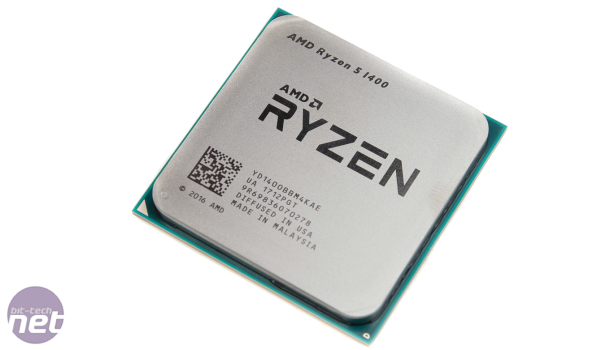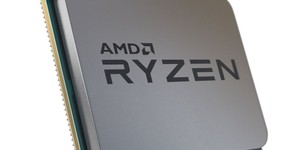
Overclocking
There's reason to be optimistic about owning the Ryzen 5 1400, as we managed to get it to the same 4GHz frequency across all four cores as its more expensive sibling, the 1500X, so it does seem to represent good value, at least in terms of overclocking potential. This was with a vcore of 1.425V, and with a CPU temperature of 69°C and ambient room temperature of 23°C there's probably a little room for pushing things further. However, we found 4.1GHz was out of reach even at 1.435V, and as AMD itself states that 1.45V should be a short-term voltage for benchmarking, there's not much scope here for getting much higher.Performance Analysis
The impact of less cache and lower clock speeds hurt the Ryzen 5 1400 even more than we'd predicted, with a HandBrake encoding time that was much longer than the stock speed Core i5-7600K and even more so compared to the Ryzen 5 1500X, which was over 30 seconds quicker in our short encode test. It was a similar story in the PCMark 8 Photo Editing test where at stock speed only the Core i3-7350K was slower. Once overclocked, things did improve, and in these two tests it performed similarly to the identically-clocked Ryzen 5 1500X, although the latter had a small edge, most likely due to the larger L3 cache.Terragen 4 is clearly optimised for Intel CPUs, and with the company being so dominant for so long, it's no surprise. As a result, the Core i5-7600K was quicker at stock speed than the overclocked Ryzen 5 1400, but thankfully in Cinebench, AMD was quicker, with the Ryzen 5 1400 outpacing the Core i5 at stock speed and by a sizeable margin even when the latter was blazing along at 5.1GHz. Simultaneous multi-threading is clearly doing its thing, with the eight threads making up for the lack of clock speed compared to the Core i5's four threads.
In games, the Ryzen 5 1400 did seem to be something of a tipping point in a couple of titles. Ashes of the Singularity: Escalation saw Intel dominating the top of the graph, but in terms of value, AMD is fairly equal, with the Ryzen 5 1600 and Core i5-7600K fairly even at stock speed and when overclocked. However, in terms of cores versus cores, Intel seems to have an advantage here, with the Core i5-7600K comfortably faster than the Ryzen 5 1400. There was also a consistent dip in the average frame rate in Fallout 4 too, and 3DMark Time Spy also puts the Ryzen 5 1500X at a noticeably higher score than the stock speed 1400.
Conclusion
We've been watching with great interest how AMD's extensive range of Ryzen CPUs would sit not just against Intel's offerings, but against each other too. Things feel quite crowded around the £200 mark and there are significant differences too with Precision Boost speeds varying by 600MHz, a difference of two cores and four threads, and 8MB L3 cache variation across the Ryzen 5 range too. However, there's less than £80 separating the Ryzen 5 1600X and 1400, and it was always going to be the case that some CPUs fared better than others.It's perhaps the other way round to what we found with Ryzen 7. There, the X-edition CPUs were considerably more expensive than the Ryzen 7 1700, yet the latter could overclock to similar levels, making it something of a bargain. With Ryzen 5, paying a little more really does pay off, with the Ryzen 5 1500X being a better bet than the 1400 thanks to higher clock speeds and its bigger L3 cache, while the Ryzen 5 1600 is even better and costs barely £40 more than the 1400. Ultimately, both the 1500X and 1600 are much better value. The former is a no-brainer for an extra £20, especially if you won't be overclocking, but we'd highly suggest forking out a little more and going for the Ryzen 5 1600, which is really where the sweet spot's at.


MSI MPG Velox 100R Chassis Review
October 14 2021 | 15:04










Want to comment? Please log in.